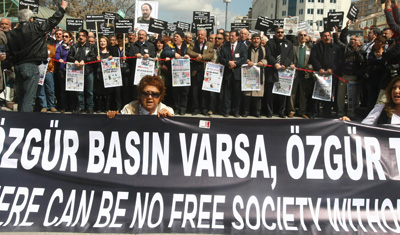Turkey has no business being the world’s leading jailer of journalists. But the numbers don’t lie. With 49 journalists imprisoned for their work, according to CPJ’s annual worldwide prison census, released today, Turkey holds more individuals behind bars than Iran (45), China (32), or Eritrea (28). How did Turkey find itself in this situation? Unlike the other countries that top CPJ’s imprisoned list, Turkey has a relatively open and vibrant media. It is an emerging democracy, a NATO member, and a candidate for European Union integration.
CPJ Special Report
• Journalist imprisonments hit record high worldwide
The use of imprisonment as a media pressure tactic in Turkey is selective. The imprisoned journalists in Turkey fall into two broad categories: Kurdish journalists the government alleges are linked to a violent separatist movement; and leftists and ultranationalists accused of conspiring to overthrow the government.
The charges are obviously serious, which is why CPJ spent months this year reviewing the case files to determine whether there was sufficient evidence to substantiate the allegations. There was not, we concluded. In fact, in many cases the evidence consisted of journalistic activity such as published articles, interviews, phone calls, and notes.
(While mainstream journalists face a great deal of pressure–punitive lawsuits, internal censorship from media owners, personal and ad hominem attacks from political leaders–few express fear that they will be jailed.)
Turkey’s position as the world’s leading jailer of journalists was first confirmed by CPJ in our October special report, Turkey’s Press Freedom Crisis. It caused much consternation and hand-wringing in Ankara; the mood was tense when CPJ board member Kati Marton met with Justice Minister Sadullah Ergin to discuss our findings.
But there is a central point of agreement among many of those following the issue: The underlying problem is the restrictive legal environment in which journalists face prosecution under sweeping national security laws, many promulgated during an era when the military held sway over Turkish politics. The government of Prime Minister Recep Tayyip Erdoğan has pledged to reform these laws, and it has taken some positive steps.
But for the reform process to be credible, CPJ believes that Turkey must first shed its position as the world’s leading jailer of journalists. There has been some recent progress. The number of journalists in prison in Turkey has dropped, from 61 to 49, since our October report was issued. The courts have released a number of journalists who were being held while their cases awaited resolution.
Still, more than 80 percent of the journalists in Turkish jails today have not been convicted of a crime. They are being held in open-ended detentions as their cases await court verdicts. Determination of who is released while awaiting a court verdict seems arbitrary. Defendants accused of the same crime and facing the same evidence are treated differently. One is released, another languishes behind bars.
Turkey’s prosecutors and judges must exercise their discretionary authority to see that all journalists held in pre-verdict detention are released. Of course, simply releasing journalists being held in pre-verdict detention will hardly resolve the crisis. Those released will still face very serious charges and could be thrown in jail at any time. In addition, CPJ research shows that those already convicted had been subjected to due process and procedural violations. We believe their convictions should be overturned, and we will continue to advocate for their release.
However, a sharp reduction in the number jailed is a necessary first step that will build public confidence, both domestically and internationally, and therefore greatly improve prospects for the reform process that is under way. Much is at stake. Turkey’s broader strategic goals–asserting regional leadership, attaining European integration, and retaining global investor confidence in the rule of law–are undermined by the country’s repressive policies toward the media. Turkey’s aspirations are attainable. But they will remain out of reach as long as the country retains its title as the world’s leading jailer of journalists.
